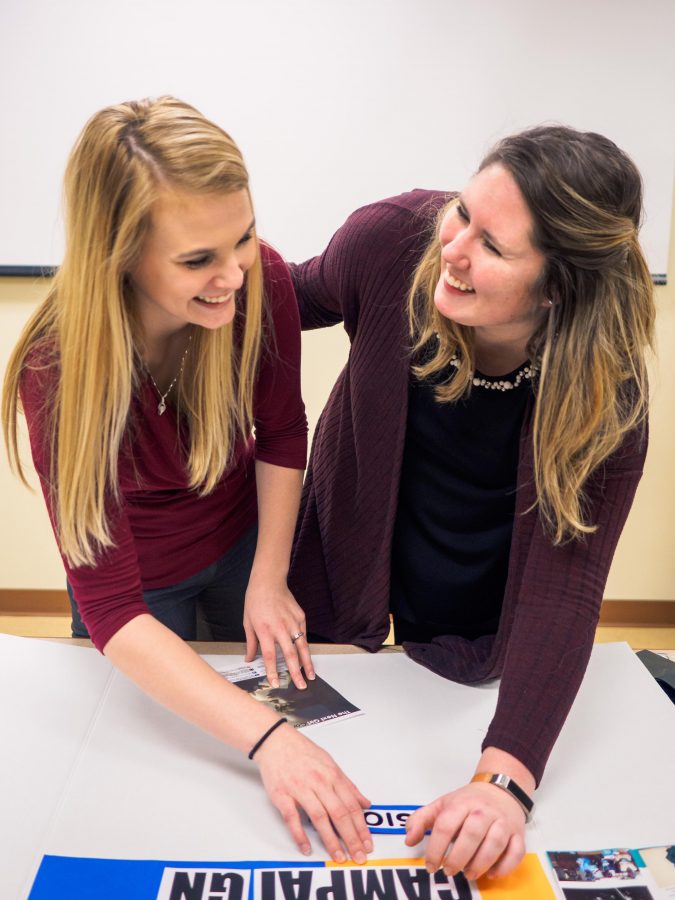‘If the girl wins, everyone wins’: building a bridge from Uganda to Champaign
Tori and Brooke, both senior students at the School of Social Work, make poster to promote the Next Girl Campaign on Monday night, Jan 23 2017.
January 24, 2017
At a University with a large population of in-state students, some students may only familiarize themselves within relatively similar circles of people. But a campus RSO founded just a few months ago is trying to change that — with an added twist.
In early September, Brooke Garren, senior in Social Work, came across a notice on a weekly bulletin for a dinner to discuss incarcerated parents. After bringing along her friend Victoria Palmer, also a senior in Social Work, they became inspired.
“We went and thought the message was crazy awesome,” Garren said. “We thought, ‘What can we do to get involved? We’re poor college students so we can’t give them very much money, so what can we do?’”
For help the pair turned to Francis Ssuubi, founder of Wells of Hope — a ministry founded in 2002 aimed to help orphaned children in Uganda whose parents are incarcerated through funding, intervention programs and the promotion of community.
Garren and Brooks approached Ssuubi with an interest in learning more about parental incarceration before getting involved in Wells Of Hope.
Get The Daily Illini in your inbox!
“Specifically a father, once he is arrested, his children are considered cursed (in Uganda),” Garren said. “After that, the mother will most likely not want the children because they are cursed. They look at men more highly so they may only take in the male children and leave the female children to fend for themselves or sell them off at 12 or 13 to get married.”
Females that are becoming orphans are much more vulnerable due to how their gender is viewed in Ugandan culture.
“Wells of Hope Ministry focuses so much on the females because they are at that much more of a higher risk and they’re more likely to get raped or sexually exploited,” Palmer said. “Francis realized that they’re more at risk and more of a vulnerable population, and his goal was really to go after and help those girls.”
Ssuubi believes the fight to solve the issues of parental incarceration start with the females. He said girls are undermined because people think they belong in the kitchen to take care of their family. In Uganda, women are not given formal schooling and are instead traded for wealth.
“What we want to do is raise the awareness of parental incarceration and how it affects children, but highlight the plight young girls go through. If we succeed with young girls, then all the other people will come in the picture. If the girls win, then everybody wins,” Ssuubi said.
Although more girls are admitted to the program, both male and female individuals with incarcerated parents receive all types of support from Wells of Hope.
Ssuubi said Wells Of Hope works to help children cope with parental incarceration. The organization runs an orphanage in Uganda which currently houses 123 children. Wells Of Hope also provides free education, food and clothing, and facilitates the children to visit their parents in prison.
The ministry tries to help ease the process to reduce trauma in young lives.
“This has helped the children to deal with the stress and trauma that comes as a result of having a parent in prison, but above this it has helped save the children from risks such as child rape, child labor and diseases,” Ssuubi said.
After learning more about Wells Of Hope, Garren and Palmer decided to get involved. They approached Ssuubi with the intention of starting a chapter of the Next Girl Campaign on campus. Issues dealt with in the RSO are an extension of the ministry’s goals. Although it’s only a few months old, Next Girl Campaign has already set up a pen-pal system with the orphans in Uganda.
“We’re still in the grassroots part of it,” Garren said. “Right now we have about 10 members who are committed to writing and corresponding with a girl. The girls get a biography and picture, then you write them a letter and correspond back and forth.”
The Next Girl Campaign is also planning to implement fundraising initiatives as part of the club. Garren said the Next Girl Campaign plans to hold a concert and start fundraising at local restaurants. The RSO has set of minimum fundraising goal of $420 a year which covers the cost to house and educate one child in Wells Of Hope.
Next Girl Campaign aims to not only impact the lives of at-risk Ugandan orphans, but also to expand the perspective of University students.
“Part of it is just education and awareness,” Palmer said. “We live in a little bubble and don’t see what else is going on in the world. This is one opportunity where students on campus can have that experience. You can volunteer locally, but this is not something you could experience only on campus.”
Next Girl Campaign plans to set up monthly meetings through the School of Social Work and recruit more members to expand the club and prepare to pass it down to the next generation of students.
“Brooke and I have this image of us being the vision keepers and members this semester and encourage others to be more active in leadership roles,” Palmer said. “Brooke is more administrative and I tend to be more emotionally supportive — but I think we are looking for others to help step up.”







